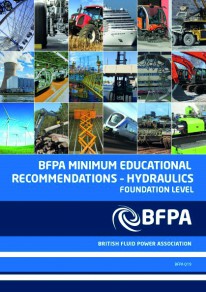BFPA defines minimum educational requirements in fluid power

By leveraging the resources of its Education and Training (E&T) Committee, the British Fluid Power Association (BFPA) has developed a publication entitled ‘BFPA Minimum Educational Recommendations – Hydraulics’ as part of a three-part suite of Educational Recommendations which also cover Pneumatics and Electronic Control of Fluid Power. This new document presents the consolidated view of leading representatives and experts in fluid power – including academia, representatives from other BFPA member organisations, OEMs and the wider UK engineering industry – managed by a specially convened BFPA E&T Taskforce.
Ian McKenna, plant technical support supervisor at Bachy Soletanche in Lancashire, explained the need for adequate training: “We deal with big hydraulic drilling rigs – often with pressures up to 350 bar – and because people don’t see what is going on inside, they often don’t appreciate the dangers. This is especially true of new, young engineers who already have a digitally-based background, but very little appreciation of heavy ‘analogue’ equipment.”
A big step forward
He continued: “A prescribed minimum level training is a big step forward, as it will show from an early stage that you are working with equipment and media that could kill you. Technicians, operators, designers and maintenance engineers all need to understand how severe it could be – even by simply undoing a fitting. They all need minimum level of training in fluid power from the word go.
“We find that new staff who have been to college as part of an apprenticeship have not gone into enough depth in hydraulics and, since the downturn in manufacturing a few years back, there are no longer the staff to perform shadowing and traditional on-the-job training. As a result, we have created our own internal training course, which covers 90% of the BFPA’s minimum recommendations, and is in the process of being tailored to match them 100%.”
Graham Spencer, senior instructor at Festo, agrees with McKenna on the recent plight of UK engineering and the necessity for a consensus-based training regimen: “The emphasis on engineering in the UK has diminished recently. A huge blip some years ago, resulted in the throughput of people who would pick this up in their everyday job simply stopping. Luckily, this ‘error of ways’ has now been recognised, but we have still experienced a huge loss of skills. There just aren’t the people coming through that know this stuff. People haven’t been learning from others and there are fewer apprentices.”
He continued: “Luckily, this blip has galvanised industry, and the primary parties are all feeding their thoughts and concerns back into BFPA, the result being publications such as the ‘BFPA Minimum Educational Recommendations – Hydraulics.”
Training programmes to help everyone
Martin Kingsbury, membership and training director at the BFPA, explained the rationale behind the development of the document and the way forwards: “With fluid power technology being deployed in such a wide variety of industries, it is essential that we have some form of minimum requirement that addresses the needs of a contemporary workforce. We have now set up training programmes to help everyone – from the operator or technician on the shop floor up to the engineers – attain these levels.
-
PPMA 2025
23 September, 2025, 9:30 - 25 September, 2025, 16:00
NEC, Birmingham UK -
Advanced Engineering Show 2025
29 October, 2025, 9:00 - 30 October, 2025, 16:00
NEC, Birmingham UK










